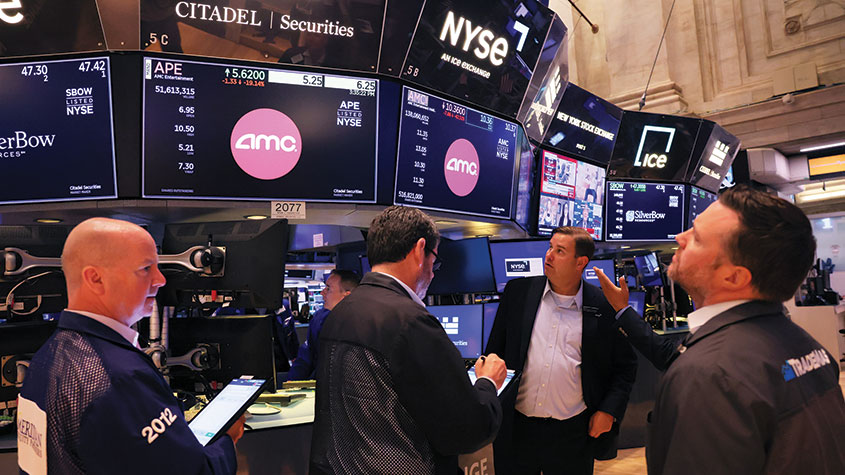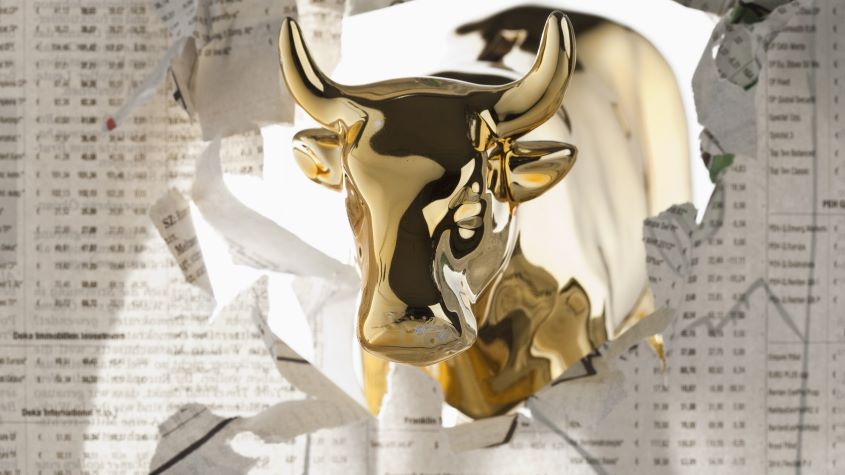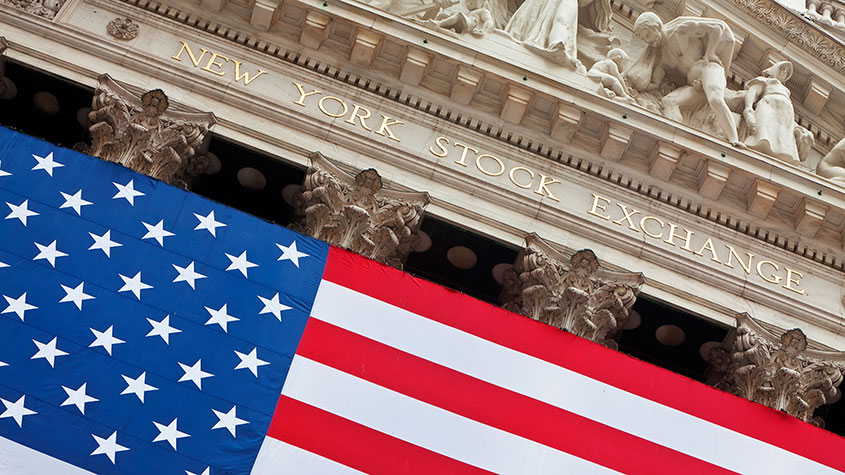Are stocks back in a bull market or is this just a bear market rally?
The S&P 500 index gained 17% between its June lows and 16 August, while the Nasdaq Composite rose more than 20%. So are stocks back in a bull market or is this just a brief rally before they resume their slide?

Get the latest financial news, insights and expert analysis from our award-winning MoneyWeek team, to help you understand what really matters when it comes to your finances.
You are now subscribed
Your newsletter sign-up was successful
Want to add more newsletters?

Twice daily
MoneyWeek
Get the latest financial news, insights and expert analysis from our award-winning MoneyWeek team, to help you understand what really matters when it comes to your finances.

Four times a week
Look After My Bills
Sign up to our free money-saving newsletter, filled with the latest news and expert advice to help you find the best tips and deals for managing your bills. Start saving today!
“The extreme pessimism of the first half of 2022 seems a distant memory” on Wall Street, says Nicholas Jasinski in Barron’s. “War in Europe, runaway inflation” and “a behind-the-curve Federal Reserve” saw US stocks suffer their worst first half in more than 50 years.
Yet the S&P 500 index gained 17% between its June lows and 16 August, while the tech-heavy Nasdaq rose more than 20%, a milestone widely considered to herald a new bull market. The FTSE 100 rose 7% over the same period.
Why confidence has grown
This summer’s rally has proceeded in two stages, says Thomas Mathews of Capital Economics. “Until early August” it was driven by “unwinding of expectations for Fed rate hikes” amid bets that a slowing economy would soon show inflation the door. Since then, growing confidence that the US is heading for a “soft landing” in the wake of solid corporate results and continued strength in the jobs market has kept the bulls running.
MoneyWeek
Subscribe to MoneyWeek today and get your first six magazine issues absolutely FREE

Sign up to Money Morning
Don't miss the latest investment and personal finances news, market analysis, plus money-saving tips with our free twice-daily newsletter
Don't miss the latest investment and personal finances news, market analysis, plus money-saving tips with our free twice-daily newsletter
“The S&P has retraced 50% of its losses from the 3 January high to the 16 June low,” says Bob Pisani for CNBC. That has encouraged some to argue that the bear market is over. “History reminds us that the S&P 500 never set a lower low in any post-World War II bear market after recovering 50% of that peak-to trough decline,” says Sam Stovall of CFRA Research.
There are other reasons to hope this rally might stick, says Tom Stevenson in The Telegraph. Rather than being driven by the technology and growth stocks that led the post-pandemic upswing, market leadership has shifted towards “utilities, energy and dividend paying shares”. That makes this feel like a fresh bull market rather than a rehash of the last one.
On the other hand, this summer’s rally has brought renewed interest in meme stocks such as Bed Bath & Beyond, a market mania with a distinctly 2021 flavour. Speculative options trading, “a popular vehicle for retail investors looking to place leveraged bets in hopes of outsized gains”, has also made a return, says Saqib Iqbal Ahmed on Reuters. Ten-day average daily trading volume of single stock options is “at a more-than six-month high”, according to data from Trade Alert.
Investment bank traders warn that the bounce has been “driven by hedge funds unwinding bearish bets”, say Eric Platt and Ortenca Aliaj in the Financial Times. This summer’s rally has forced hedge funds to cover “short bets” they had made earlier this year, but that doesn’t suggest there is much “conviction” around that this is a new bull market. “There is no real follow-up from long-only or fundamental buyers, who are largely on the sidelines,” says Justin Cummings of Savoy Capital.
Investors seem to be pricing in a lot of good news, says The Economist. “Inflation is far from being vanquished” and the Fed, “having been late to react to the inflation surge… is unlikely to turn on a dime”. China’s economy is slowing and Europe is heading for a gloomy winter. And as experienced investors will tell you, “most past market downturns included plenty of breathtaking bear-market rallies before... prices resumed their downwards march”.
Get the latest financial news, insights and expert analysis from our award-winning MoneyWeek team, to help you understand what really matters when it comes to your finances.
Alex is an investment writer who has been contributing to MoneyWeek since 2015. He has been the magazine’s markets editor since 2019.
Alex has a passion for demystifying the often arcane world of finance for a general readership. While financial media tends to focus compulsively on the latest trend, the best opportunities can lie forgotten elsewhere.
He is especially interested in European equities – where his fluent French helps him to cover the continent’s largest bourse – and emerging markets, where his experience living in Beijing, and conversational Chinese, prove useful.
Hailing from Leeds, he studied Philosophy, Politics and Economics at the University of Oxford. He also holds a Master of Public Health from the University of Manchester.
-
 Early signs of the AI apocalypse?
Early signs of the AI apocalypse?Uncertainty is rife as investors question what the impact of AI will be.
-
 Reach for the stars to boost Britain's space industry
Reach for the stars to boost Britain's space industryopinion We can’t afford to neglect Britain's space industry. Unfortunately, the government is taking completely the wrong approach, says Matthew Lynn
-
 Is it different this time for Japanese stocks?
Is it different this time for Japanese stocks?Analysis Nikkei 225 Index has jumped 19.8% this year, and there are signs the rally could continue.
-
 As China reopens, why pick an income strategy?
As China reopens, why pick an income strategy?Advertisement Feature Yoojeong Oh, Investment Manager, abrdn Asian Income Fund Limited
-
 Is Japan the best market to invest in now?
Is Japan the best market to invest in now?Opinion Japan puts Western economies to shame and offers good value for both equity and bond investors, says Max King.
-
 The highest yielding S&P 500 Dividend Aristocrats
The highest yielding S&P 500 Dividend AristocratsTips Dividends are a key component of investment returns in the long-term. A portfolio of dividend aristocrats is a great way to build wealth and a sustainable income stream.
-
 2023 will be a bumper year for stocks. Here’s how to play the rally
2023 will be a bumper year for stocks. Here’s how to play the rallyTips Dominic Frisby explains why he thinks the market rally could have further to run in 2023 despite macroeconomic headwinds
-
 A new dawn for Asian markets?
A new dawn for Asian markets?Advertisement Feature James Thom, Investment Manager, abrdn New Dawn Investment Trust plc
-
 China’s post-covid investment boom off to a slow start. Should you still invest in China?
China’s post-covid investment boom off to a slow start. Should you still invest in China?Advice Investors are no longer bullish on the China shop but the gloomy consensus on Beijing’s economy might be unfair. Should you invest in China?
-
 Stock market crash? This time it’s (slightly) different
Stock market crash? This time it’s (slightly) differentOpinion The bears expecting a stock market crash have got it wrong, says Max King.